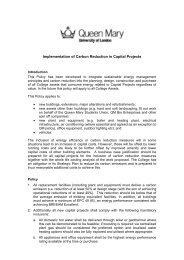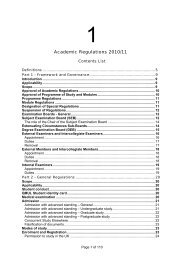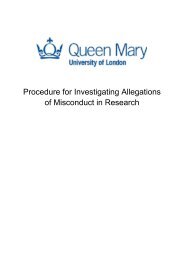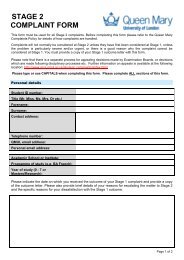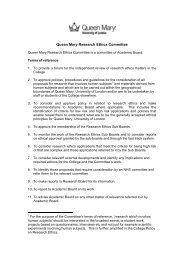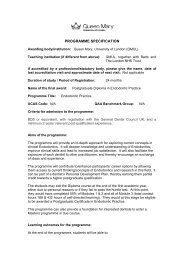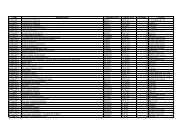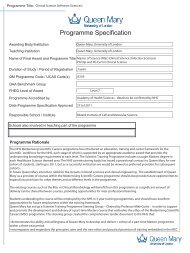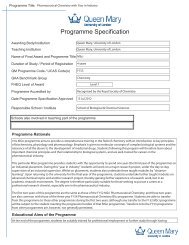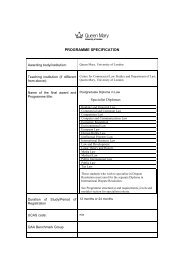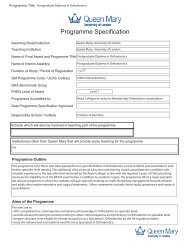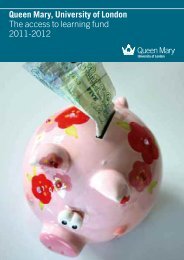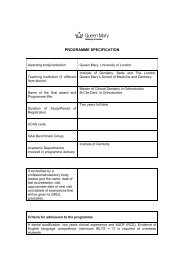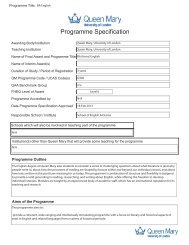Red pen version - Academic Registry and Council Secretariat ...
Red pen version - Academic Registry and Council Secretariat ...
Red pen version - Academic Registry and Council Secretariat ...
Create successful ePaper yourself
Turn your PDF publications into a flip-book with our unique Google optimized e-Paper software.
Assessment H<strong>and</strong>book 2012-13: 3. Setting Assessment3. Setting AssessmentGeneral3.1 Assessment shall be set <strong>and</strong> approved as part of the module approval process, <strong>and</strong>details (including reassessment information) shall be communicated to students atthe start of the academic year (<strong>Academic</strong> Regulations, 3.4).3.2 Every element of assessment must be tied to specific learning outcomes for theassociated module. The marking scheme for the assessment should likewisemeasure the learning outcomes, though where intended learning outcomes are‘generic’, the assessment marking schema may likewise be generic). The mostcommonly used marking schemes/systems are criterion referencing, model answers,<strong>and</strong> skeleton answers. QM recognises the need for variations in practice in the use ofmarking schemes to take account of discipline based differences.3.23.2In-course assessment3.53.3 In-course assessment refers to all module assessment except for examinations. Thefollowing assessment categories used at QM are considered as in-courseassessment: coursework, practical assessment, professional capability, <strong>and</strong>dissertation/project (<strong>Academic</strong> Regulations, 3.3-3.7; 3.60-3.79). Formal definitions ofthe assessment categories are given in Section 2 of the Assessment H<strong>and</strong>book.3.63.4 Examples of good practice <strong>and</strong> approaches for designing in-course assessment maybe found in the Code of Practice on Assessment <strong>and</strong> Feedback (Ap<strong>pen</strong>dix B), <strong>and</strong>online: www.learninginstitute.qmul.ac.uk.3.73.5 There is no formal requirement for in-course assessment to be approved by externalexaminers. However, it is good practice to seek external examiners’ views on thenature of proposed assessments. Where modules are assessed solely by in-courseassessments, SEBs are strongly encouraged to discuss the assessment design withthe external examiner, as well as student performance <strong>and</strong> results. SEBs mustsupply marking schemes to external examiners at the time of sending theassessment itself. These can (<strong>and</strong> should) still be amended following comments fromthe externals or discovery of alternative solutions.3.5Dissertations <strong>and</strong> projects3.93.6 Titles for individual dissertations <strong>and</strong> projects shall be agreed between students <strong>and</strong>supervisors. Titles may be selected from prescribed lists, or derived fromdiscussions. Marking schemes tailored to the specific module learning outcomesshall be made available to students at the beginning of the academic year (as is thecase for all modules).3.103.7 It is strongly recommended that supervisors <strong>and</strong> students keep summaryrecords of supervision meetings. These are helpful for monitoring progress, <strong>and</strong> canbe useful in allegations of inadequate supervision.In-class tests3.113.8 In-class tests <strong>and</strong> mid-semester tests are not considered to be invigilatedexaminations; they are not covered by the Regulations for Invigilated Examinations.These tests shall be classified as ‘coursework’. The dates of tests shall be released10



